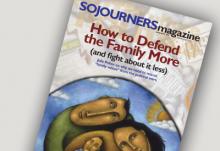Preaching

If preachers are preoccupied with pursuing the life of conscpicuous consumption and preaching a "prosperity gospel," then poor people are in big trouble.

Exploring the difference between the public truth of the sermon and the private truth of the memoir.

Editor's note: In June 2006, Barack Obama, then a U.S. senator from Illinois, delivered a speech about the role of religion in politics at a conference sponsored by Sojourners/Call to Renewal. Obama spoke candidly about as his own Christian faith as well as the dangers of sectarianism in a pluralistic democracy; to this day it remains his most comprehensive speech on faith in the public sphere. Sojourners ran the following excerpt of Obama’s speech in our November 2006 issue.
I’d like to look at the connection between religion and politics and offer some thoughts about how we can sort through some of the often-bitter arguments that we’ve been seeing over the last several years. We can raise up the religious call to address poverty and environmental stewardship all we want, but it won’t have an impact unless we tackle head-on the mutual suspicion that sometimes exists between religious America and secular America—a debate we’ve been having in this country for the last 30 years over the role of religion in politics.
For some time now, there has been plenty of talk among pundits and pollsters that the political divide in this country has fallen sharply along religious lines. Indeed, the single biggest “gap” in party affiliation among white Americans today is not between men and women, or those who reside in so-called Red States and those who reside in Blue, but between those who attend church regularly and those who don’t. Conservative leaders have been all too happy to exploit this gap, consistently reminding evangelical Christians that Democrats disrespect their values and dislike their church, while suggesting to the rest of the country that religious Americans care only about the issues of abortion and gay marriage, school prayer and intelligent design.
Democrats, for the most part, have taken the bait. At best, we may try to avoid the conversation about religious values altogether, fearful of offending anyone and claiming that—regardless of our personal beliefs—constitutional principles tie our hands. At worst, there are some liberals who dismiss religion in the public square as inherently irrational or intolerant, insisting on a caricature of religious Americans that paints them as fanatical, or thinking that the very word “Christian” describes one’s political opponents, not people of faith.

